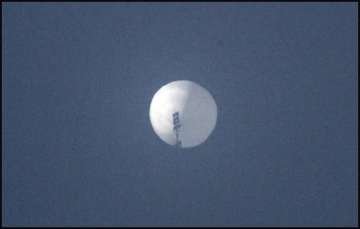Chinese surveillance balloon spotted near Taiwan ahead of presidential election amid fears of interference
At least 26 Chinese military aircraft and 10 Chinese navy vessels were detected alongside the surveillance balloon in the 24 hours before Friday morning. Taiwan has already warned that Beijing will attempt to interfere in the ballot to get electors to vote for the candidate China prefers.

A Chinese military surveillance balloon was spotted in the Taiwan Strait, similar to the one seen in the US, along with a large-scale deployment of military aircraft and ships, said the Taiwanese Defence Ministry on Friday, raising fears of Chinese interference in the presidential election scheduled for next month in the self-governed island nation.
According to the Ministry, the balloon was monitored flying at an approximate altitude of 6,400 metres and passed southwest of the northern port city of Keelung on Thursday night before moving eastward and disappearing possibly into the Pacific Ocean. Taiwan has threatened to shoot down such balloons but this time, the ministry did not specify any action to be taken.
At least 26 Chinese military aircraft and 10 Chinese navy vessels were detected in the 24 hours before Friday morning. Out of those 26 aircraft, 15 crossed the median line which is an unofficial divider between the sides, but which Beijing refuses to recognise.
Taiwan warns about election interference
Such incursions occur regularly as a means of advertising China’s threat to use force to annex the self-governing island republic it considers its own territory. Taiwan's Defence Minister Chiu Kuo-cheng said that the ministry will "closely monitor the enemy's situation" near the island.
"If you listen to the statements by (China’s) Taiwan Affairs Office, it's so blatant. They are commenting in very negative language against (Taiwan’s) Vice President Lai (Ching-te) or the vice-presidential candidate Bi-khim Hsiao. And those kinds of statements have already told the Taiwanese people that they (China) want to interfere in Taiwan's election and they want to shape the results of the election, and they are telling the Taiwanese people that if you vote for this political party, that means war, vote for the other political party means peace," Reuters quoted Taiwan's Foreign Minister Joseph Wu as saying.
"So, they (China) are doing all sorts of things to interfere in our election and we can expect more leading up to our voting date,” he added. The development comes as Taiwan prepares for its next presidential elections on January 13 next year. Taiwan has already warned that Beijing will attempt to interfere in the ballot to get electors to vote for the candidate China prefers.
Chinese 'spy balloon' seen over the US
Meanwhile, the already strained relations between China and the US plunged further after US President Joe Biden ordered the shooting down of a Chinese spy balloon after it traversed the continental United States on January 28 this year. This also prompted US Secretary of State Antony Blinken to cancel his trip to Beijing.
On February 5, the US military shot down the Chinese spy balloon over the Atlantic Ocean and launched a mission to recover all the equipment from its debris, drawing a strong reaction from China which warned of repercussions over America's use of force against its civilian unmanned airship. Senior US officials claimed that the balloon had gathered intelligence from several sensitive American military sites.
Although Beijing accepted that the giant balloon was taken off from its territory but refuted the claims of sending spy equipment to the US. Instead, it termed the helium balloon a "weather data collector" and added it was floated towards the US by the flow of wind.
Later, Beijing claimed Washington of breaching its airspace at least ten times in the past 13 months. According to China, the US high-altitude balloons illegally flew over Chinese airspace on more than 10 occasions without the approval of the relevant Chinese authorities.
China's threatening tactics towards Taiwan
Last month, China flew as many as 43 military aircraft and seven ships near the self-ruled island, largely seen as an attempt by Beijing to sway Taiwan’s presidential election in January. The ruling Democratic Progressive Party, which leans toward formal independence for the island, is anathema to the Chinese government. China backs the Opposition candidates who bat for working with the mainland.
Taiwan and China split in 1949 when the communists took control of China during a civil war. The Nationalists who suffered loss fled to Taiwan and formed their own government here. The island is self-governing, though only a few foreign nations give it official diplomatic recognition. The US among others has formal ties with China while maintaining a representative office in Taiwan.
Recently, at an international defence forum in Beijing, China's second-ranking military official Zhang Youxia reiterated threats by the Chinese government to retaliate against moves toward establishing Taiwan's formal independence. He said that “no matter who tries to split Taiwan from China in any form, China and the Chinese military will never allow that to happen".
(with inputs from agencies)